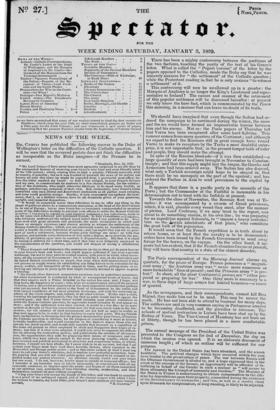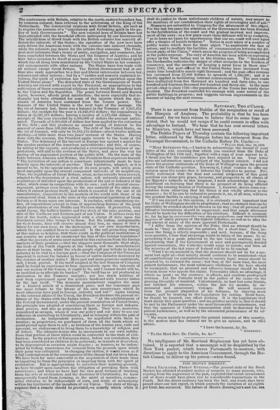The annual message of the President of the United States
was presented to the Congress on the 2nd of December, the day on which the session was opened. It is an elaborate document of immense length ; of which an outline will be sufficient for our purpose.
The harvest in the United States has been abundant, and the season healthful. The political changes which have occurred within the year. have tended to the preservation of peace. The war between Russia and the Ottoman Government is alluded to, and a hope expressed that in the event of the success of the former, an opportunity will be afforded of in- terfering in behalf of the Greeks in such a manner as "will secure to them ultimately the triumph of humanity and freedom." The Minister of the States in France is endeavouring to obtain compensation to the citi- zens for depredations upon their property, committed during the existence of the Revolutionary Governments ; and this, as well as a similar claim upon Denmark for compensation, of longstanding, is likely to be adjusted. The controversy with Britain, relative to the north-easternboundary has, by common consent, been referred to the arbitration of the King of the Netherlands. The commercial relations with Great Britain, are such as to require the exercise of a "conciliatory and forbearing spirit in the po- Hey of both Governments." The new colonial laws of Britain have not been attended with the beneficial effects anticipated by our Government. The interdiction of direct trade with the British colonies has scarcely af- fected the interests of the States ; the operation of the new laws have only driven the American trade with the colonies into indirect channels, while the colonists pay dearer for the articles they consume. The Presi- dent next intimates that a treaty of amity, navigation, and commerce, has been concluded between the States and the Emperor of Austria; and he here takes occasion to dwell at some length on the free and liberal spirit which has all along been manifested by the United States in her commer- cial arrangements with other nations. The States have free trade with all nations except Great Britain. The British Government had at one time also made approaches to a free and liberal intercourse between her colonies and other nations ; but by a " sudden and scarcely explained re- vulsion, the spirit of exclusion has been revived for operation upon the United States alone." The disturbed state of the Governments of South America are viewed with regret by the President, as unpropitious to the cultivation of those commercial relations which would be beneficial both to the Union and the Republics. The peace between Brazil and Buenos Ayres, however, affords great satisfaction ; the more especially that in- demnity has been obtained for some of the injuries which the mer- chants of America have sustained from the former power. The finances of the United States is the next topic of the message. On the 1st of January last, there was a balance in the Treasury of 5,861,972 dollars ; the receipts for the year is 24,940,863 dollars ; the expenditure is taken at 25,637,511 dollars ; leaving a surplus of 5,125,638 dollars. The receipts of the year exceeded by 2,000;000 of dollars the amount antici- pated. Upwards of 9,000,000 of dollars has been applied to the extinction of the debt ; and this produces an annual saving of interest to the amount of more than 500,000 dollars. The debt of the United States, on the 1st of January, will only be 58,362,155 dollars—about twelve millions sterling—or little more than two years' revenue of the States. Having done with the revenue, the President again reverts to the trade of the States. The deficiency of the harvest in Europe has opened a market for the surplus produce of the American agriculturists; and this, of course, by adding to the exports, and producing a corresponding increase of im- portations, will add to the revenue of the States, and pave the way for paying off an augmented portion of the public debt. On the state of the trade between America and Britain, the President thus expresses himself. "The legislation of one nation is sometimes intentionally made to bear heavily upon the interests of another. That legislation, adapted, as it is meant to be, to the special interests of its own people, will often press most unequally upon the several component interests of its neighbours. Thus, the legislation of Great Britain, when, as has recently been avowed, adapted to the depression of a rival nation, will naturally abound with , regulations of interdict upon the productions of the soil or industry of the other, which come in competition with its own ; and will present encou- ragement, perhaps even bounty, to the raw material of the other state, which it cannot produce itself, and which is essential for the use of its manufactures, competitors in the markets of the world with those of its commercial rival. Such is the state of the coramercial legislation of Great Britain as it bears upon our interests. It excludes, with interdicting du- ties, all importation (except in time of approaching famine) of the great staple productions of our Middle and Western states. It proscribes, with equal rigour, the bulkier lumber and live stock of the same portion, and also of the Northern and Eastern part of our Union. It refuses even the rice of the South, unless aggravated with a charge of duty upon the Northern carrier who brings it to them. But the cotton, indispensable for their looms, they Will receive almost duty free, to weave ie IMO a fabric for our own wear, to the destruction of our own manufactures, which they are enabled thus to undersell. Is the self-protecting energy of this nation so helpless, that there exists in the political institutions of our country no power to counteract the bias of this foreign legislation ? that the growers of grain must submit to this exclusion from the foreign markets of their produce ;—that the shippers must dismantle their ships, the trade of the North stagnate at the wharfs, and the manufacturers starve at their looms, while the whole people shall pay tribute to foreign industry to be clad in a foreign garb ;—that the Congress of the Union are impotent to restore the balance in favour of native industry destroyed by the statutes of another realm ? More just and more generous sentiments, will, I trust, prevail. If the tariff adopted at the last Session of Congress shall be found by experience to bear oppressively upon the interests of any one section of the Union, it ought to be, and I cannot doubt will be, so modified as to alleviate its burden." The tariff has as yet produced no diminution in the Treasury receipts ; nor has much addition of cost been experienced upon the articles burdened with heavier duties by the last tariff. "The domestic manufacturer supplies the same or a kindred article at a diminished price, and the consumer pays the same tribute to the labour of his own countryman which he must otherwise have paid to foreign industry and toil." Again turning to the internal affairs of the Union, the President discloses the present re- lations of the States with the Indian tribes. "At the establishment of the Federal Government, under the present constitution of United States, the principle was adopted of considering them as foreign and indepen- dent powers, and also as proprietors of lands. They were, moreover, considered as savages, whom it was our policy and our duty to use our influence in converting to Christianity, and in bringing within the pale of civilization. As independent powers, we negotiated with them by treaties ; as proprietors, we purchased of them all the lands which we could prevail upon them to sell ; as brethren of the human race, rude and ignorant, we endeavoured to bring them to a knowledge of religion and of letters. The ultimate design was to incorporate in our own institu- tions that portion of them which could be converted to the state of civi- lization. lathe practice of European states, before our revolution, they bad been considered as children to be governed ; as tenants at discretion, to be dispossessed as occasion might require ; as hunters, to be indem- nified by trifling concessions for removal from the grounds upon which their game was extirpated. In changing the system, it wild seem as if a full contemplation of the consequences of the change had not been taken. 'We have been far more successful in the acquisition of their lands than in imparting to them the principles or inspiring them with the spirit of civilization. But in appropriating to ourselves their hunting-grounds, we have brought upon ourselves the obligation of providing them with subsistence ; and when we have had the rare good fortune of teaching them the arts of civilization and the doctrines of Christianity, we have unexpectedly found them forming, in the midst of ourselves, commu- nities claiming to be independent of ours, and rivals of sovereignty within the territories of the members of our Union. This state of things requires that a remedy should be provided,.—'a remedy which while it shall do justice to those unfortunate children of nature, may secure to the members of our confederation their rights of sovereignty and of soil."
Measures.are submitted to Congress for the attainment of this object. For the last ten years the attention of the Government has been directed to the fortification of the coast and the gradual increase and improve- ment of the navy : in a few years more these defences will be so complete, "as to leave no cause for apprehension that our sea-coast will ever again offer a theatre of hostile invasion." Notice is next taken of a number of public works which have for their object "to ameliorate the face of nature, and to multiply the facilities of communication between the dif- ferent parts of the Union," which are in the progress of being accomplished at the public expense. The navy of America has been active in repressing W i piracy in the West Indian and n the Grecian seas. The "blockade of the Dardanelles indicates the danger of other obstacles to the freedom of commerce, and the necessity of keeping a naval force in those seas." Since 1792, the post-offices in the United States have increased from, under four hundred to nearly eight thousand ; and the post-office revenue has increased from 67,000 dollars to upwards of 1,500,000; and it is wholly applied in facilitating internal communication. The post-roads have multiplied from five thousand six hundred and forty-two, to -one hundred and fourteen thousand five hundred and thirty-six. In the same period—that is since 1792—the population of the Union has nearly thrice doubled. The President concludes his message with some notice of the public buildings in progress ; and suggests various improvements in the manner of taking the next census.






















 Previous page
Previous page